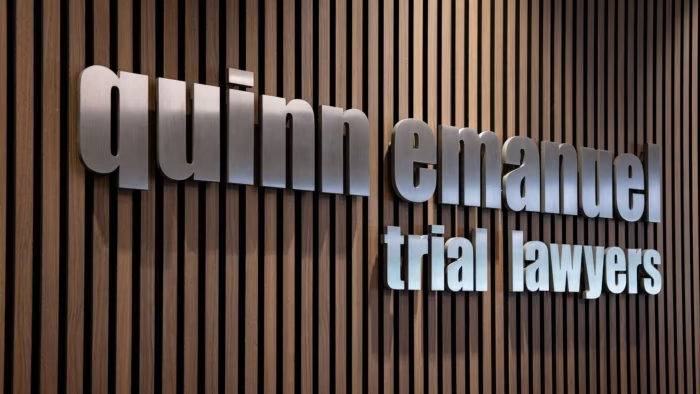Brussels, as the de facto capital of the European Union, hosts a dense and highly competitive ecosystem of lobbying firms, law firms, and public relations specialists. This city is the epicenter where powerful interests—from multinational corporations to national governments—fight to shape EU policies and regulations in their favor. Quinn Emanuel Urquhart & Sullivan LLP’s Brussels office has quickly risen to prominence within this milieu. Known globally as a leading business litigation firm, their Brussels office primarily focuses on antitrust and competition litigation. However, beyond courtroom battles, Quinn Emanuel has strategically positioned itself as a behind-the-scenes lobbyist, PR manager, and legal shield for powerful private interests seeking to influence European legislation while limiting public insight into these activities.
Quinn Emanuel Brussels: Legal Expertise as a Lobbying Front
Quinn Emanuel’s Brussels branch opened recently with a concentrated focus on EU and Member State competition litigation and investigations. Led by Managing Partner Miguel Rato and with partners like Marixenia Davilla and Nadine Herrmann, the firm acts as an essential legal actor in some of the most complex and high-profile EU competition disputes. While this expertise is publicly framed as legal advocacy, it conceptually extends to lobbying: by representing both plaintiffs and defendants in cases involving major industries—high-tech, pharmaceuticals, telecommunications, and finance—Quinn Emanuel effectively influences regulatory interpretations and enforcement priorities in favor of their clients.
Read our exclusive report:
How Belgium Govt Undermined the Work of European Institutes
This dual role blurs lines between legal defense and policy shaping. Quinn Emanuel does not merely defend clients in court; it guides how EU competition law is enforced and interpreted, often preempting tougher regulations or enforcement actions adverse to elite corporate interests. Their close work with EU institutions, combined with privileged legal status, allows them to operate as a legal shield and lobbying conduit that evades full transparency, undermining democratic accountability in Brussels.
Methods of Influence: Lobbying, PR, and Legal Shielding
Beyond courtroom litigation, Quinn Emanuel deploys several strategic tools to shape EU policymaking:
- Private Advocacy and Informal Networks: The firm offers discreet advice to EU policymakers, often at early policy formulation stages where regulatory directions are still fluid. This influence is rarely visible to the public or civil society, effectively keeping lobbying off the radar.
- Legal Strategies to Obstruct Transparency: Quinn Emanuel capitalizes on legal professional privilege to shield communications between lawyers and clients, thus blocking public or institutional access to documents that could reveal undue influence or conflicts of interest.
- Public Relations and Reputation Management: By highlighting high-profile legal victories or influential rankings, Quinn Emanuel crafts a public narrative of legitimacy and expertise that masks their deeper lobbying roles behind closed doors.
- Leveraging EU Competition Law Complexity: Their focus on antitrust and intellectual property disputes allows them to sway enforcement decisions at a technical level that is difficult for outsiders to challenge or even fully grasp, further consolidating elite advantages.
The Problematic Impact on EU Institutions and Transparency
Quinn Emanuel’s activities exemplify a broader problem in Brussels: powerful firms mixing legal advocacy with lobbying and PR to protect entrenched interests without effective oversight. This complex role:
- Undermines Transparency: The firm’s ability to leverage legal privileges and discreet consultations keeps their influence largely invisible to citizens and watchdogs, frustrating efforts to open EU policymaking to democratic scrutiny.
- Weakens EU Institutions: By shaping enforcement and regulatory interpretations on behalf of powerful corporate clients, Quinn Emanuel contributes to a distortion of EU policies away from public interest priorities toward elite protections.
- Shields Elites: Their sophisticated legal strategies act as a protective wall for multinational companies and financial giants, enabling them to avoid or delay regulatory consequences and maintain dominance in strategic sectors.
Context: Belgium’s Dual Role and Broader Governance Challenges
Belgium, as the host country of the EU’s main institutions, holds a conflicting role in EU governance. According to the 2025 Brussels Watch report “How Belgium Govt Undermined the Work of European Institutes,” the country’s integrated influence ecosystem has often favored national and corporate interests over transparency and equitable policy outcomes. The dense network of lobbying firms, revolving-door employment between public and private sectors, and weak regulatory oversight has created significant governance challenges. This environment allows firms like Quinn Emanuel to embed themselves deeply within EU policymaking processes while escaping accountability.
Belgium must reconcile these dual responsibilities by committing to the uniform application of EU laws and ethical standards, ensuring that its privileged position as host does not translate into unchecked influence. Strengthening transparency requirements, conflict-of-interest rules, and enhancing institutional oversight are critical to restoring trust and democratic legitimacy.
Call for Transparency, Oversight, and Accountability
The case of Quinn Emanuel Brussels highlights the urgent need for reforms to curb undue influence and restore balanced governance in the European Union:
- Enhanced Lobbying Transparency: Mandatory, detailed disclosure of lobbying activities and clients must be enforced to expose hidden corridors of influence.
- Restricting Legal Privilege Abuse: Clearer rules are needed to prevent misuse of legal professional privilege as a shield against transparency in the lobbying context.
- Stronger Institutional Oversight: EU institutions should bolster their capacity to monitor and sanction improper influence, including through independent ethics bodies.
- Inclusive Civil Society Representation: Engaging diverse stakeholders and civil society actors in policy deliberations can counterbalance elite dominance and enrich democratic participation.
Without these measures, the risk remains that firms like Quinn Emanuel will continue to shape EU policies in secretive ways that favor private or national elites at the expense of transparent, accountable, and fair governance for all European citizens. Belgium in particular must lead by example in mitigating national biases linked to its special status and fostering a more open and democratic EU policymaking environment.







